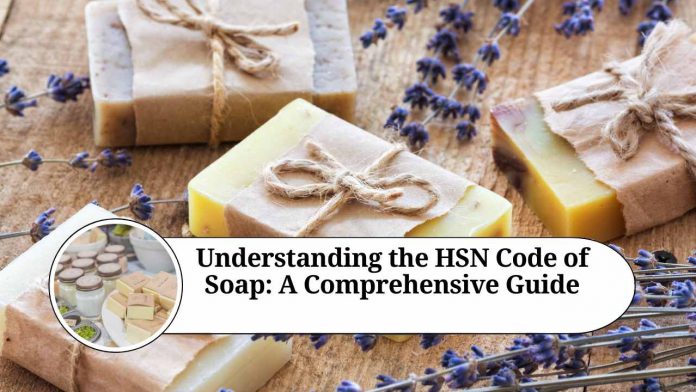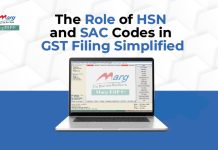Understanding the HSN Code of Soap
If you are a manufacturer, exporter, or importer of soap, you might have come across the term “HSN Code” while dealing with customs and tax authorities. HSN stands for Harmonized System of Nomenclature, and it is an internationally recognized code system used to classify goods for customs and trade purposes. In this blog, we will discuss the HSN Code of Soap and its importance in trade.
What is HSN Code of Soap?
The HSN Code of Soap is 34.01. This code falls under Chapter 34 of the HSN system, which covers “Soap, organic surface-active agents, washing preparations, lubricating preparations, artificial waxes, prepared waxes, polishing or scouring preparations, candles, and similar articles, modeling pastes, dental waxes, and dental preparations with a basis of plaster.”
The HSN Code of Soap is further classified based on the type of soap. For instance, the HSN Code of Toilet Soap is 3401.11, while the HSN Code of Laundry Soap is 3401.19.
Importance of HSN Code of Soap
The HSN Code of Soap is crucial for importers and exporters to determine the customs duty and taxes applicable to their product. It helps in the proper classification of soap products and ensures that the correct tax rates are applied.
Moreover, the HSN Code of Soap is also used in trade statistics to analyze the import and export trends of soap products. It helps in monitoring the trade flows and identifying the potential markets for soap manufacturers.
Understanding the Different Types of Soap and Their HSN Codes
As mentioned earlier, the HSN Code of Soap is further classified based on the type of soap. Let’s take a look at the different types of soap and their corresponding HSN Codes.
- Toilet Soap – HSN Code 3401.11: Toilet soap is a type of soap used for personal hygiene purposes. It is typically made of fatty acids, sodium hydroxide, and perfume. Toilet soap is further classified based on its form, such as solid, liquid, or cream.
- Laundry Soap – HSN Code 3401.19: Laundry soap is a type of soap used for washing clothes. It is typically made of sodium hydroxide, tallow, and vegetable oils. Laundry soap is further classified based on its form, such as powder or liquid.
- Medicated Soap – HSN Code 3401.20: Medicated soap is a type of soap that contains active ingredients to treat various skin conditions. It is typically used to treat acne, eczema, and other skin disorders. Medicated soap is further classified based on its function, such as antifungal or antibacterial.
- Transparent Soap – HSN Code 3401.30: Transparent soap is a type of soap that is translucent in appearance. It is typically made of glycerin, sorbitol, and water. Transparent soap is further classified based on its function, such as moisturizing or exfoliating.
- Other Soap – HSN Code 3401.90: Other soap includes all types of soap that do not fall under the above categories. It includes specialty soaps such as shaving soap, baby soap, and handmade soap.
Importance of Proper Classification of Soap Using HSN Code
Proper classification of soap using the correct HSN Code is essential for importers and exporters to determine the customs duty and taxes applicable to their product. If soap is incorrectly classified, it could result in the imposition of higher customs duty and taxes, leading to increased costs for the importer or exporter.
Additionally, the HSN Code of Soap is crucial for trade statistics to monitor the trade flows of soap products. It helps in analyzing the import and export trends of different types of soap and identifying potential markets for soap manufacturers.
Conclusion
In conclusion, the HSN Code of Soap is a standardized system used to classify soap products for customs and trade purposes. The correct classification of soap using the appropriate HSN Code is crucial for importers and exporters to determine the customs duty and taxes applicable to their product. Moreover, the HSN Code of Soap is essential in trade statistics to analyze the import and export trends of different types of soap and identify potential markets for soap manufacturers.
Read more useful content:
Frequently Asked Questions (FAQs)
- What is an HSN Code?
An HSN code is a standardized system used to classify goods for customs and trade purposes. It is an internationally recognized code system that helps in the proper identification and classification of goods.
- Why is the HSN Code of Soap important?
The HSN Code of Soap is important for importers and exporters to determine the customs duty and taxes applicable to their product. It also helps in analyzing the import and export trends of different types of soap and identifying potential markets for soap manufacturers.
- How is the HSN Code of Soap determined?
The HSN Code of Soap is determined based on the type of soap and its composition. It is further classified based on the function, form, and purpose of the soap.
- What are the different types of soap and their HSN Codes?
The different types of soap and their HSN Codes include toilet soap (HSN Code 3401.11), laundry soap (HSN Code 3401.19), medicated soap (HSN Code 3401.20), transparent soap (HSN Code 3401.30), and other soap (HSN Code 3401.90).
- How is the HSN Code of Soap used for customs and trade purposes?
The HSN Code of Soap is used to determine the customs duty and taxes applicable to soap products. It is also used in trade statistics to analyze the import and export trends of different types of soap and identify potential markets for soap manufacturers.
- Do I need to know the HSN Code of Soap if I am a soap manufacturer?
Yes, as a soap manufacturer, you need to know the HSN Code of Soap to properly classify your product for customs and tax purposes. This helps in determining the correct customs duty and taxes applicable to your product.
- How do I find the HSN Code of Soap for my product?
You can find the HSN Code of Soap for your product by referring to the HSN system, which is a standardized system used to classify goods. You can also consult with customs and tax authorities for assistance in determining the appropriate HSN Code.
- Can the HSN Code of Soap change?
Yes, the HSN Code of Soap can change over time as new soap products are introduced or as changes are made to the classification system. It is important to stay updated on any changes to ensure proper classification of soap products.
- What happens if I incorrectly classify my soap product using the wrong HSN Code?
Incorrect classification of soap products using the wrong HSN Code could result in the imposition of higher customs duty and taxes, leading to increased costs for the importer or exporter. It is important to use the correct HSN Code to avoid any potential penalties or fines.
- Is the HSN Code of Soap used in all countries?
No, the HSN Code of Soap is not used in all countries. However, many countries use a similar system to classify goods for customs and trade purposes. It is important to consult with the customs and tax authorities of each country to determine the appropriate classification system.




















